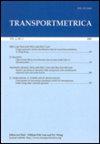Hybrid predictive control strategy for a public transport system with uncertain demand
引用次数: 95
Abstract
In this article, a hybrid predictive control (HPC) strategy is formulated for the real-time optimisation of a public transport system operation run using buses. For this problem, the hybrid predictive controller corresponds to the bus dispatcher, who dynamically provides the optimal control actions to the bus system to minimise users’ total travel time (on-vehicle ride time plus waiting time at stops). The HPC framework includes a dynamic objective function and a predictive model of the bus system, written in discrete time, where events are triggered when a bus arrives at a bus stop. Upon these events, the HPC controller makes decisions based on two well-known real-time transit control actions, holding and expressing. Additionally, the uncertain passenger demand is included in the model as a disturbance and then predicted based on both offline and online information of passenger behaviour. The resulting optimisation problem of the HPC strategy at every event is Np-hard and needs an efficient algorithm to solve it in terms of computation time and accuracy. We chose an ad hoc implementation of a Genetic Algorithm that permits the proper management of the trade-off between these two aspects. For real-time implementation, the design of this HPC strategy considers newly available transport technology such as the availability of automatic passenger counters (APCs) and automatic vehicle location (AVL) devices. Illustrative simulations at 2, 5 and 10 steps ahead are conducted, and promising results showing the advantages of the real-time control schemes are reported and discussed.需求不确定的公共交通系统混合预测控制策略
本文提出了一种混合预测控制(HPC)策略,用于公共汽车运行的公共交通系统的实时优化。对于这一问题,混合预测控制器对应于公交调度员,调度员动态地向公交系统提供最优控制动作,以最小化用户的总出行时间(乘车时间加上站内等待时间)。HPC框架包括一个动态目标函数和一个以离散时间编写的公交系统预测模型,其中当公交车到达公交车站时触发事件。基于这些事件,HPC控制器根据两个众所周知的实时过境控制动作——保持和表达来进行决策。在此基础上,将不确定的乘客需求作为干扰因素纳入模型,并结合乘客行为的在线和离线信息进行预测。由此产生的HPC策略在每个事件下的优化问题都是np困难的,在计算时间和精度方面需要一个有效的算法来解决。我们选择了一个遗传算法的临时实现,它允许对这两个方面之间的权衡进行适当的管理。为了实时实现,这种HPC策略的设计考虑了最新可用的运输技术,如自动乘客计数器(apc)和自动车辆定位(AVL)设备的可用性。在2、5和10步前进行了说明性仿真,并报告和讨论了显示实时控制方案优势的有希望的结果。
本文章由计算机程序翻译,如有差异,请以英文原文为准。
求助全文
约1分钟内获得全文
求助全文

 求助内容:
求助内容: 应助结果提醒方式:
应助结果提醒方式:


